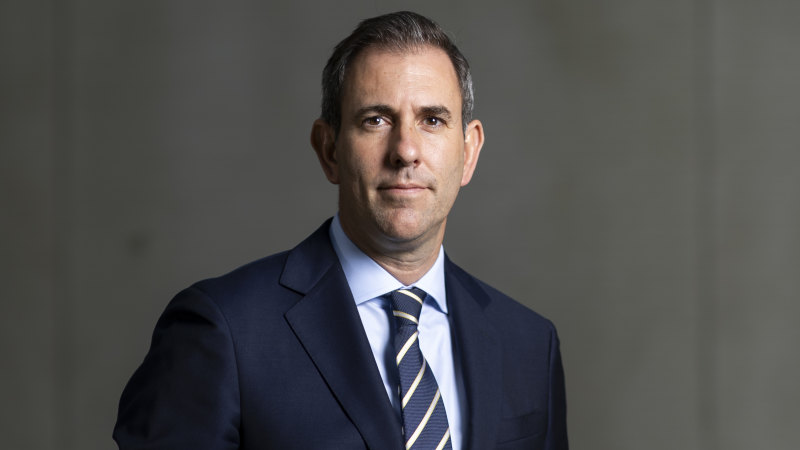Save articles for later
Add articles to your saved list and come back to them any time.
Treasurer Jim Chalmers has slammed critics who claim he has failed to reform the economy and lift the nation’s growth, pointing to dozens of changes as proof that Labor has done more in one year than others did in a decade.
Promising more reform in the year ahead, Chalmers said the government would consider further help on the cost of living in the May budget and cited the recent increase in real wages as a sign that Labor was delivering results for households.
Treasurer Jim Chalmers says economic management must be a core strength for Labor.Credit: Alex Ellinghausen
Opposition Leader Peter Dutton has accused the government of caving to the unions on workplace laws, while the Greens call on it to repeal the $313 billion “stage three” tax cuts and economists have called for tougher decisions on tax and competition.
Frustrated with claims he was not doing enough, Chalmers listed dozens of changes including higher taxes on oil and gas exporters and lower tax concessions on big superannuation funds, as well as the $22 billion budget surplus.
“We have done more economic reform in the last year than we’ve seen in Australia in the last decade,” he said in an interview.
“Right across the board, we are making our economy more modern, and we’re recognising that the economy that got us the last 30 years of prosperity isn’t going to deliver us the next 30 years of prosperity.”
Chalmers said critics were showing the “muscle memory” of complaints about previous governments that had not delivered significant change.
“It has applied to governments of the past, it just doesn’t happen to apply to our government,” he said.
“The defining theme for us is modernisation – we are modernising our economy, across so many different areas, and I think that those reforms will pay off.”
Asked if this meant Australians should expect more reform in 2024, the treasurer agreed there would be a focus on new measures in the rest of this term of parliament.
“I think inevitably, in the life of any government, but perhaps particularly a first-term government, the balance shifts over time from cleaning up after your predecessors and implementing your election commitments – it shifts towards building on your achievements,” he said.
The government’s internal list of major results and reforms includes the creation of 620,000 new jobs, the easing of inflation in recent quarters, the increase in real wages in the past two quarters, the first surplus in 15 years and the commitment to net-zero greenhouse gas emissions.
Opposition treasury spokesman Angus Taylor has blamed the government for weak productivity and a higher cost of living this year.
“This is crushing households, absolutely crushing households –rising taxes, rising mortgage payments, rising prices,” Taylor said.
With Labor losing ground to the Coalition in opinion polls, Prime Minister Anthony Albanese released a video on social media on the weekend to highlight these outcomes as well as energy rebates for households, free entry to many TAFE courses and a cut to the cost of medicine by doubling the timeframe for pharmaceutical scripts from 30 to 60 days.
In one example of the concern about an absence of reform, the Australian Financial Review marked the anniversary of the floating of the Australian dollar in 1983 with an editorial about the “dog’s breakfast” of federal-state relations and said the was no “brave new world of prosperity” on the political horizon.
Independent economist Saul Eslake said Labor should attempt more ambitious reform but said Chalmers was “not completely wrong” to say this government had achieved more than the last one.
“I’m struggling to think of any significant economic reform that the previous government did,” he said.
Eslake said two examples the Coalition might name as reforms – setting up a different company tax rate for small businesses and spending more federal funds on GST proceeds to the states – were public policy mistakes.
The GST top-up was meant to cost $2.3 billion over three years but is costing at least $30 billion and was extended at a national cabinet meeting this month.
“The government has done what I would call worthwhile but minor reform,” Eslake said, citing the changes to super, childcare and taxes on oil and gas, but he said Chalmers had a chance to set out greater ambitions before the next election.
“This is not a reforming government, yet. Let’s see him put the case for a bold agenda at the next election, because if they do not do it then they will probably never do it.”
Another independent economist, Chris Richardson, said the government’s reforms had been “pretty modest” but that this was not a surprise.
“One reason is we change governments when the incoming lot promise they won’t do much – we elect small targets, and so the mandates are small,” he said.
“Number two is when governments do make changes, they lose more skin than used to be the case.”
Richardson said the priority reforms for this government should include policies to inject more competition into the economy, improve federal financial relations with the states and expand the housing supply.
He also noted that some of the most important reforms had been done – “you can only float the Australian dollar once” – and this made further change more complex.
Start the day with a summary of the day’s most important and interesting stories, analysis and insights. Sign up for our Morning Edition newsletter.
Most Viewed in Politics
From our partners
Source: Read Full Article

